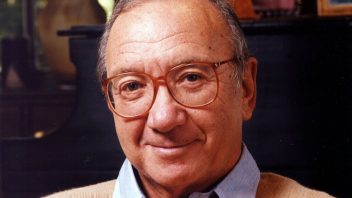
The Hebrew word “dayenu” means “it would have been enough.” As an example of its use, consider this:
If Neil Simon had only written “The Odd Couple” and “Barefoot In The Park,” DAYENU.
Or: If Neil Simon had only written “The Sunshine Boys” and “Plaza Suite,” DAYENU.
Or: If Neil Simon had only written “Brighton Beach Memoirs,” “Biloxi Blues,” and “Broadway Bound,” DAYENU.
Any combination of those plays — as well as his screenplays for “The Goodbye Girl,” “Murder By Death,” “The Heartbreak Kid,” and so many more — would qualify for a Dayenu. Such a combination would also qualify him as one damned good writer, but I’d contend he was more than that. He was the best playwright of my lifetime.
You can read elsewhere all the accolades for Simon, who died this weekend at 91, as the man who once had four Broadway shows running simultaneously, had more Oscar and Tony nominations than anyone in history, and is still the only playwright to have a theater named for him while still alive. For me, a Doc Simon script meant the perfect words at the perfect pace at the perfect time. Take, for instance, this exchange between Willie and Al, the ex-vaudevillians in “The Sunshine Boys”:
Willie: You know Sol Burton died?
Al: Go on. Who’s Sol Burton?
Willie: You don’t remember Sol Burton?
Al: Oh, yes, the manager from the Belasco.
Willie: That was Sol Bernstein.
Al: Not Sol Bernstein. Sol Burton was the manager from the Belasco.
Willie: Sol Bernstein was the manager from the Belasco, and it wasn’t the Belasco, it was the Morosco.
Al: Sid Weinstein was the manager from the Morosco. Sol Burton was the manager from the Belasco. Sol Bernstein I don’t know who the hell he was…. Wait a minute. Wasn’t Sid Weinstein the songwriter?
Willie: No, fer chrissakes, that’s Sol Burton!!
Al: Who wrote “Lady, lady, be my baby”?
Willie: That’s what I’m telling you. Sol Burton, the lousy songwriter.
Al: Oh, that Sol Burton. He died?
Willie: Last week.
Al: Where?
Willie: In Variety.
I saw almost all of Simon’s movies and was fortunate to see many of his productions on Broadway, including his semi-autobiographical “BB” trilogy, with Matthew Broderick and later Jonathan Silverman playing Eugene Jerome, a fictional version of Simon’s early life growing up in New York, going off to Army basic training during World War II, and then back home to begin his writing career. I can still remember Broderick’s acrobatic movements in the “Biloxi Blues” scene with Rowena, a prostitute played by Randall Edwards, as well as Linda Lavin’s grace as Kate, telling her son Eugene about the most glamorous night of her life, when she got to dance with the movie star George Raft. It was in the “BB” trilogy that Simon became more than just a comedy writer — he’d added empathy and emotion to his character’s lives, and to ours.
Simon’s problem was that, in his later career, he sometimes crossed that line a little too far, forsaking the comedy for damp desperate drama, particularly in scripts he wrote for his wife, Marsha Mason (e.g. “Chapter Two” and “Max Dugan Returns”). He also allowed himself to be talked into repeatedly remaking “The Odd Couple” with different casting options and even a bad sequel. But Simon hit the bullseye when he gave us Mason and Richard Dreyfuss in “The Goodbye Girl,” one of the great rom-com pairings — before that was even a term used to describe such movies. And he was hitting on all comedic cylinders when he wrote “Murder By Death,” the still-hysterical parody of mystery novelists and cliché private eyes.
Even if he’d never done any of that, I’d still say dayenu if Simon had written nothing more than this line from “The Odd Couple,” in which Oscar Madison explains to his roommate how annoying it was to find a note on his pillow: “We’re all out of corn flakes — F.U.” It took me three hours to figure out that F.U. meant Felix Unger!
No single human has been responsible for more laughs in more venues than Neil Simon. Whoever is behind this year’s Tony Awards has their work cut out in developing just the right tribute to this giant of the American theater, whose scripts will still be produced for decades to come in theaters big and small around the world.
DAYENU.
